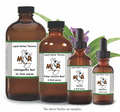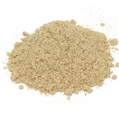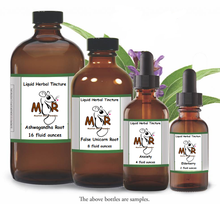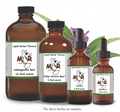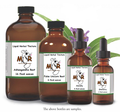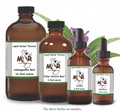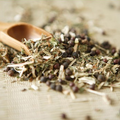 Loading... Please wait...
Loading... Please wait...- Home
- Herbal Tinctures
- Herbal Tinctures - Combination
- Menstrual Cramping Herbal Tincture
- Home
- Herbal Tinctures
- Herbal Tinctures - Women
- Menstrual Cramping Herbal Tincture
Menstrual Cramping Herbal Tincture
Product Description
Herbal Tincture for Painful Menstruation
For many women their bleeding time each month can be a painful experience. For thousands of years women have come up for a variety of reasons why this is happening to them, and the pain can vary from woman to woman. For some women the pain is debilitating.
Painful menstruation is known as Dysmenorrhea which literally means “difficult menstruation”. Each month when the uterine lining sheds as menstruation, the uterus must contract. In women with dysmenorrhea the contractions are very painful. The uterus may even spasm. Pain can be localized to the lower abdomen, but it can also be in the lower back, in the vulva, as well as radiating down the thighs. This wave like pain is often accompanied by headache, dizziness, nausea, vomiting, and diarrhea. The pain can begin up to 24 hours before menses begins and usually lasts for the first 48 hours once menses begins. In some women the pain may last up to 72 hours once menses begins.
Painful menstruation is one of the leading causes for women to miss work. This type of regular monthly pain also makes painful menstruation one of the leading reasons for regular use of NSAID’s (nonsteroidal anti-inflammatory drugs).
If you have extremely painful menstruation it is important to talk to your doctor about this. It is important to rule out if what you are experiencing is actual Primary Dysmenorrhea, or Secondary Dysmennorrhea. Primary means that it is the first issue, whereas secondary means there is another health issue causing or contributing to the painful menstruation. For example; Secondary Dysmenorrhea is often caused by endometriosis, ovarian cysts, or uterine fibroids. There may also be other factors that are causing pain that may also need to be ruled out, such as IBS, constipation, UTI, ect. If you know that you have other fertility issues that are the underlying cause of your menstrual pain, it is important to address those issues as well. While it is always easier to treat pain acutely (when it is happening) rather than address the root cause, it is very important to find out what is causing the pain in your body.
What Causes Painful Menstrual Cramps?
In the ‘70’s studies began to come out that showed a link to why women experience painful menstrual cramps. Scientists discovered that women with menstrual cramps had high levels of prostaglandin F2 alpha (PGF2). Prostaglandin F2 alpha is made by the uterus to stop progesterone production when there has been no implantation at the end of the menstrual cycle. Women with Dysmennorhea have been shown to produce 7 times more prostaglandin F2 alpha than women who do not. When the prostaglandin F2 alpha is released into the blood stream in high levels it causes the uterus to spasm. This also creates a state of inflammation because PGF2 is a known inflammatory chemical in the body. Uterine cramping and inflammation is the cause of the pain. Scientists still do not know why the body produces more PGF2 in women with painful menstrual cramps.
Natural Ways to Decrease Menstrual Cramp Pain
When considering using herbs for painful menstrual cramps we have to consider how herbs work in the body. As an herbalist I use different herbs for different actions and/or outcomes. You have to consider the therapeutic goal of the treatment. Menstrual cramps have more to do with than just pain. While some women have heavy bleeding with their painful period, others have a sense of stagnation, a boggy uterus with a very scant period; yet both of these can fall under a diagnosis of Dysmennorhea. You must also consider hormonal balance, nutrition, digestion, mental/emotional state, and pain level. Below I have broken the herbs up into sub-groups so that you can see herbs that are specific for important actions when experiencing painful menstruation.
If you are considering a more natural approach to reducing menstrual cramps please consider talking to a naturopathic doctor or herbalist in your area to see which herbal formulations are right for you.
Pain Relief & Cramp Relaxing Herbs
Note: none of these herbs should be used during pregnancy.
Cramp Bark & Black Haw: These are probably the most effective herbs for reducing uterine spasm and cramping. These sister herbs bring relief of pain and muscle spasm in the uterus. Cramp bark and Black haw have been shown safe for use for several days prior to onset on menses in anticipation and prevention of painful cramps. I can attest to these plants wonderful pain relieving action. I personally feel these herbs are one of the best herbs to have on hand at all times for any sort of menstrual pain.
Black Cohosh: This plant is very anti-inflammatory and wonderful at reducing spasm in both the smooth muscles, but also the skeletal muscles associated with pain that radiates to the lower back and down the thighs.
Dong Quai: Dong Quai is popular for women with absent period, but it has other beneficial actions. It helps to reduce menstrual cramps in women with a boggy, heavy feeling uterus due to stagnation, poor circulation and scant blood flow during menstruation. Dong Quai acts on the circulatory system and lymphatic system reducing tissue congestion. It has both analgesic and anti-inflammatory properties. It is also very relaxing to the nervous system, which may be helpful to those with anxiety or tension during PMS and menstruation. Interestingly this herb has been shown to first stimulate the uterus and then go on to relax it. Dong Quai is also a wonderful hormonal balancing herb, used since the 16ht century for the female reproductive system. Note: This herb is best not used during menstruation for women with heavy bleeding.
Wild Yam: Wild Yam has a wonderful action on smooth muscle tissue, reducing muscle spasm of the uterus, fallopian tubes and ovaries, aiding in painful menstruation and chronic pelvic pain. Wild Yam helps the uterus to work more efficiently during menses. This uterine support allows for proper function of the uterus while working to prevent uterine cramping or spasm. This herb has a wonderful action on the ovaries, toning them and aiding in ovarian cyst pain.
Red Raspberry Leaf: European and Native American women have used raspberry leaf for thousands of years for menstrual support, menstrual cramps and during pregnancy as a healthy tonic to help prepare the womb for childbirth
Ginger: If you experience nausea, vomiting or diarrhea due to painful cramping and hormonal changes, ginger is one of the best herbs to soothe the stomach. It is also anti-inflammatory. Also see Chamomile.
Anxiety, Nervous Tension, Irritability with Menstrual Cramps
Chamomile: This sweet little flower is both anti-inflammatory and antispasmodic. It is also helpful for women with digestive constipation contributing to pain. Because this herb is also a nervine and mild sedative it may help to reduce stress, relax the nervous system and induce a restful state in the body. This can be very useful when experiencing menstrual cramping accompanied by anxiety and irritability. Chamomile is best sipped as a tea during menstruation.
Valerian Root: Valerian has been primarily used traditionally as a sedative and antispasmodic for the treatment of anxiety disorders, sleep disorders, and a diverse array of conditions associated with pain. Valerian contains an important class of compounds called valepotriates and valeric acid which are found exclusively in this perennial plant native to North America and Europe. It is not difficult to see how Valerian would help to relieve pain, anxiety, and insomnia because both valepotriates and valeric acid are capable of binding to the same receptors in the brain as Valium. Although Valerian has not been scientifically studied for menstrual cramps, it has been shown to relax the spasmodic contractions of intestinal muscles. Both the uterus and intestines are smooth muscles. In clinical practice, Valerian is usually a significant feature of an alternative medicine approach to painful menstruation. The administration of Valerian may make you tired and sleepy, so it is advisable to stay home and rest or fall asleep.
Disclaimer - The information presented herein by Mountain Maus’ Remedies is intended for educational purposes only. These statements have not been evaluated by the FDA and are not intended to diagnose, cure, treat or prevent disease. Individual results may vary, and before using any supplements, it is always advisable to consult with your own health care provider.







